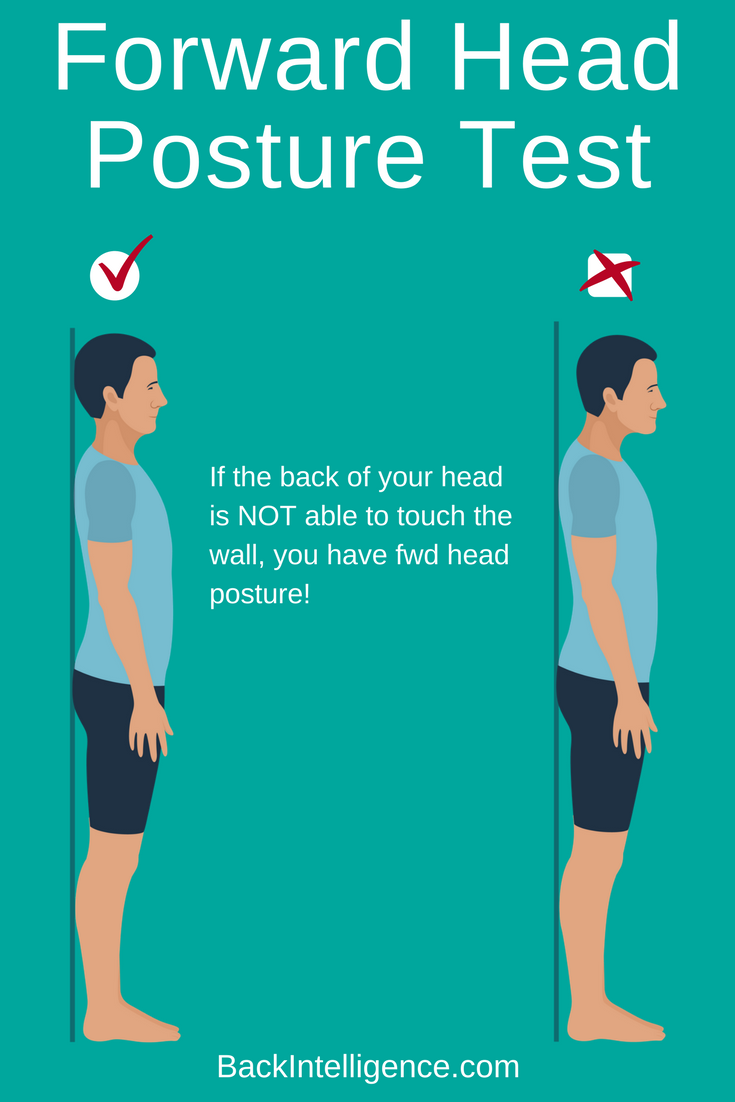Text neck and how to prevent it
Text neck: what it is and how to prevent it
“Forward head posture” goes by a lot of names, most of them unflattering.
“Nerd neck.” “Text neck.” “Scholar’s neck.”
Still, no one wants the side effects that come with this common postural deformity, which afflicts between 66% and 90% of the population.
It’s defined as a posture where your neck shifts anterior (forward), positioning the head an inch or more in front of the atlas (first neck vertebra).
It also shifts your center of gravity forward, disproportionate to the weight of the head. For every inch your eight-pound head shifts anterior the load on your neck and shoulders increases by ten pounds!
How to Tell if you Have Forward Head Posture:
Stand with your back to the wall, shoulder blades and heels touching the wall, feet shoulder-width apart. Try to achieve a neutral back position. It can help to squeeze your shoulder blades together and then release them a few times.
Is the back of your skull also touching the wall? If not, you have some degree of “text neck.”
What Causes Forward Head Posture?
Many bad habits of contemporary living can cause “text neck.”
The key culprit is long periods of time looking down.
Forward head posture can be caused by:
Too much time looking at your cell phone.
Too much time at the computer.
Too much time driving.
Carrying a heavy backpack.
Sleeping with your head too elevated—for example, too many pillows, or with your head propped against the armrest of a sofa.
Other causal factors include:
Past neck injuries.
Weak neck muscles.
Improper breathing.
Practicing sports that favor one side of your body (baseball, golf, hockey, tennis, etc.)
Professions involving repetitive movements (computer programmer, massage therapist, hairstylist, painter, writer, etc.)
“Text neck” results in tight upper back muscles and weak front-of-neck muscles. This kind of imbalance leads to all sorts of unpleasant neural, musculoskeletal, and cardiovascular side effects.
The muscles, joints, and nerves in the neck and back fall under undue pressure, resulting in upper back pain, shoulder pain, and neck pain. The rounding of the shoulders also places an extra burden on the lower back, increasing the risk of herniated discs.
These effects culminate in “tension neck syndrome,” which causes pain often indistinguishable from a tension headache. Think you suffer from “tension headaches?” The culprit may actually be your “text neck” posture.
Your changed center of balance also makes you more susceptible to falls and the ensuing injuries.
Other short-term side effects of forward head posture include:
Kyphosis (Excessive rounded shoulders)
Muscle spasm
Chronic fatigue
Restricted breathing
Temporal mandibular joint (TMJ) pain
Insomnia
Sleep apnea
Numbness and tingling of the arms and hands
Long-term side effects of “nerd neck” include:
Reduced shoulder mobility
Osteoporosis (and related fractures)
Cervical spine arthritis
Bulging Discs
Neck:How to Fix Text
Over time, forward head posture can be corrected through four lifestyle changes:
1. Use One Firm Pillow
Choose a sleeping pillow that supports the natural curve of your neck. If your pillow is either too high or too low, it could cause your head to lie in an overtaxed position … all night long, every night. The resulting muscle imbalance can be hard to correct.
Instead, choose one firm pillow that supports your head with your neck at neutral position.
2. Make your Work Station Ergonomic
While many of us sit at desks looking at computers all day, most of us can make some simple, posture-friendly adjustments.
Choose a chair-desk combo that promotes good posture by allowing you to sit with your feet firmly planted on the ground, elbows at a 90-degree angle when you rest your arms on the desk.
Position your computer screen 18-24 inches from your head (about an arm’s length), with the top of the monitor at eye level so you don’t constantly look down to see your screen content.
3. Adjust your Backpack
Choose a backpack proportional to your body. If you aren’t a huge person, don’t choose a huge backpack.
Take some time to remove unneeded items so you aren’t carrying unnecessary weight. Try to position any necessary heavy items near the center of your back to reduce excess strain on the shoulders. Also, avoid carrying your backpack with one strap to avoid excessive stress on one side of your neck.
4. Start a “Text Neck” Exercise Routine
The right exercises can improve your posture and correct forward head posture overtime. Perform several of the following exercises 2-3 times a day, 3-4 sets of each exercise:
Tilt your head forward gently, touch your chin to your chest, hold for five seconds, then release
Rotate your head to the left until you feel a mild stretch. Hold for five seconds, then repeat to the right.
Push your head forward until you feel the stretch through your throat. Hold for five seconds, then release.
Gently tilt your head to the side, attempting to touch your ear to your shoulder, until you feel a mild stretch. Hold for five seconds, release, then repeat on the other side.
Pinch and massage the muscles between your ears and your collarbone for about a minute.
Seated or standing with feet shoulder-width apart, squeeze your shoulder blades together. Hold for five seconds, then release. Try for 10-15 reps.
5. Can Chiropractors Help Treat text Neck?
When it comes to spine alignment or posture problems chiropractic services can be incredibly effective. By continuously adjusting specific joints in the spine and neck chiropractors can help to restore posture and normal motion.
Combining our tips for fixing text neck with routine chiropractic sessions will greatly benefit your journey to better health and well-being.


